By Katy Allred
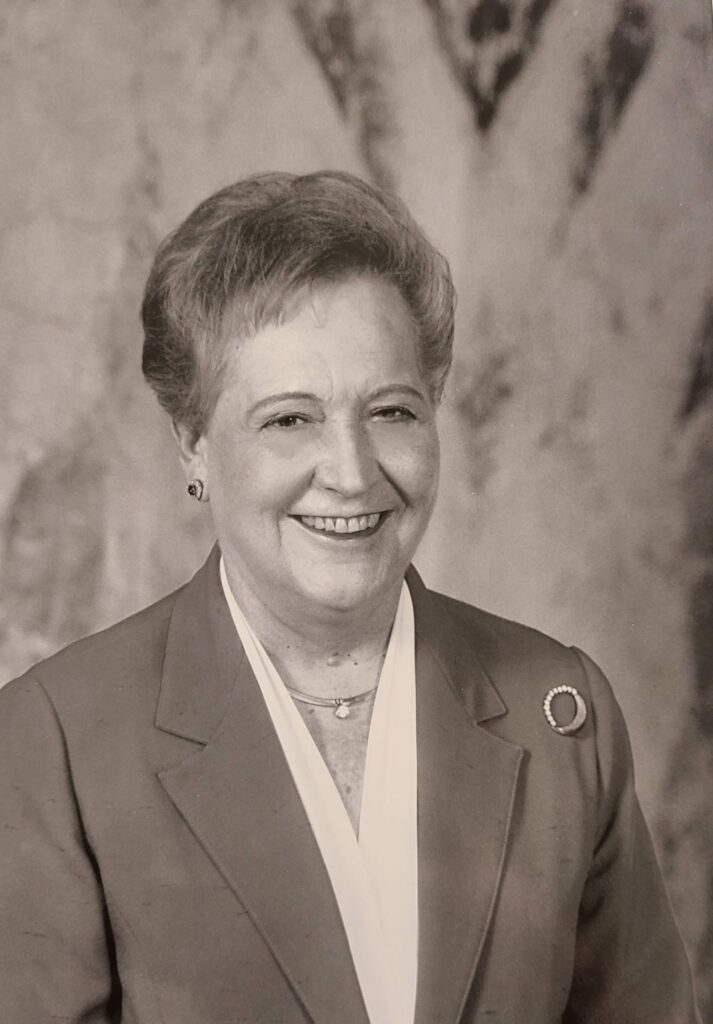
What this donor, and I believe most donors want, is a way to make a positive difference…We want people to anticipate and solve problems, to listen and to act wisely. We are prepared to assist the universities we love. The problem-solving is never finished.
—Elizabeth D, Rockwell
If you are familiar with the University of Houston (UH), you have probably seen or heard Elizabeth D. Rockwell’s name: the Elizabeth D. Rockwell Pavilion in the MD Anderson Library, the Elizabeth D. Rockwell Center on Ethics and Leadership in the Hobby School, the Elizabeth D. Rockwell President’s Suite in the Alumni Center, the Elizabeth D. Rockwell Career Services Center in the C.T. Bauer College of Business, and the endowed chairs in her name for the deans of the MD Anderson Library, the Cullen College of Engineering, and the College of Education.
As of 2022, Rockwell’s name can be found in one more place on the University of Houston campus, in the University of Houston Libraries Special Collections. UH archivists fully processed the Elizabeth D. Rockwell papers, originally accessioned in 1998, and made them available for research in February of 2022.
When archivists process an individual’s collection, they slowly get to know the person through their materials, like putting together a puzzle. Because Elizabeth passed away in 2011, I never had the privilege of meeting her before processing her papers. Fortunately, though, I did meet with Nancy Clark, who was Elizabeth’s cherished friend and colleague. Clark, who currently serves as the University of Houston’s Alumni Legacy Programs director, met Elizabeth in 1991 when Clark was serving as the director of Donor Relations. When I asked about Rockwell’s legacy, Clark said that her philanthropic and community efforts and her career were “totally interwoven. She was all of that, and she wasn’t any one [of them]. She wasn’t a person who came home and put on her volunteer hat. Everything she did was connected.” The collection bears this out, telling the story of a woman wholly woven into the fabric of the University of Houston and the broader Houston community from the very beginning.
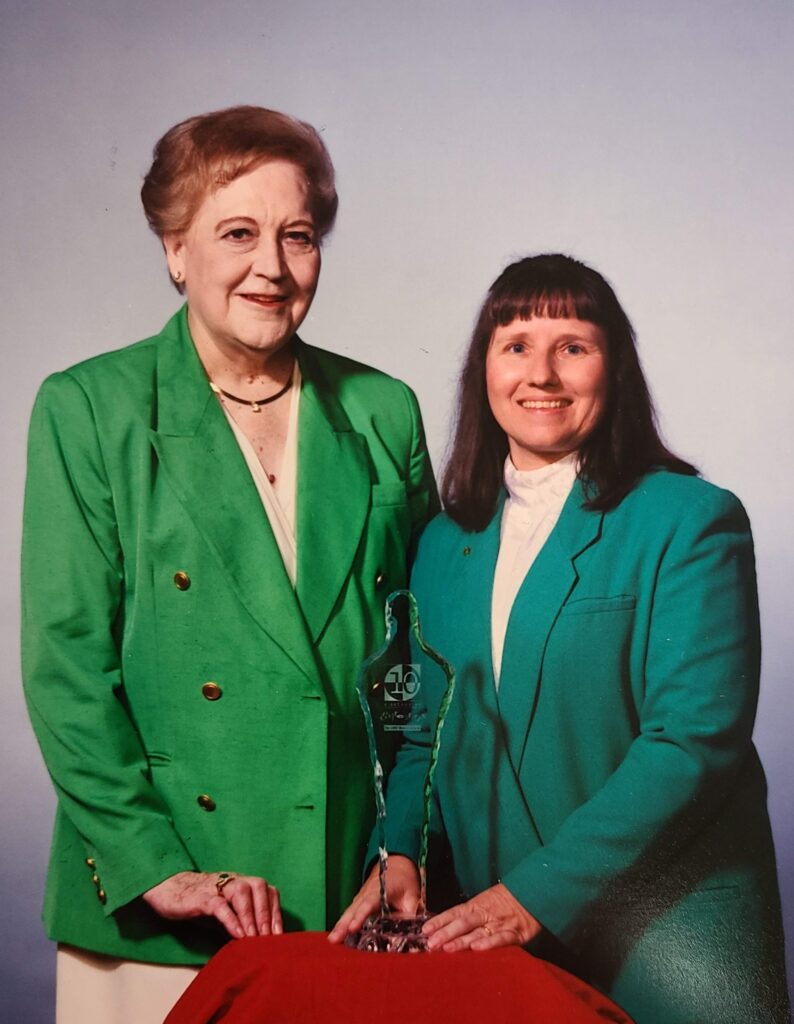
Rockwell was born Mary Elizabeth Dennis in Houston on May 19, 1921. She attended Miss Dangerfield’s Kindergarten, River Oaks Elementary, Lanier Junior High, San Jacinto High School, and was a part of the first graduating class of Lamar High School in 1938. After high school, she enrolled at University of Houston, majoring in accounting and business administration. The student body was still largely male, and, like many places that initially excluded women, it was not always easy or pleasant for the trailblazers.
Over the years, Rockwell shared many stories with Clark about her early life, such as how she reacted to criticism of her academic abilities as a woman. Clark described one event: “She’s in a geology class where there are only two females, and all the males are saying, ‘Ah, you’re here because you couldn’t make it at Rice.’ Well, you never threw a challenge to Elizabeth, so she finishes that semester, enrolls at Rice, and takes every business class they have, but it’s not enough.” Elizabeth reenrolled at UH to continue her studies, but ultimately did not obtain a college degree. (Happily, in 1999, she received an honorary doctorate from UH.) “She didn’t finish because World War II came along, and all the men were gone,” Clark continued. “But she knew they were coming back. She knew that if she was going to get a good job, she needed to actually get out into the working world, so she got out into the energy industry.” Rockwell started her first job in 1944 at Shell Oil, then moved on to Standard Oil in 1945.
Rockwell was singularly focused on being a career woman, but her family had expectations for her, too. “Her mom and her aunt told her, ‘If you die with the name Dennis, we’re going to be so ashamed of you,’ so she ended up marrying … Walter Rockwell who worked for Remington Rand,” Clark said. Before the wedding, Elizabeth told her fiancé that she would never leave Houston, and that she planned to work. They married in 1951, and within six months, Walter received a promotion, and the couple moved to Boston that same year. She stayed in the northeast with her husband for a few years, but in 1954 she moved home to Houston, dissolved the marriage, and reentered the workforce.
Rockwell’s career trajectory changed in 1967 when she took a position at Heights Savings & Loan. Retirement and estate planning quickly became her true passion in the workplace and beyond; she gave presentations, workshops, and speeches frequently in Houston and around the country, even presenting before the United States Congress on multiple occasions. Correspondence with Congressman Bill Archer, photos with Congressman Eugene Keogh, copies of the Congressional Record, and the text from her presentations can be viewed in the collection.
Rockwell began working at the investment banking company Oppenheimer in 1982, entering into a partnership with John Phillips and Charles Fahy. She worked there until her retirement in 2001, although Clark says Elizabeth was not ready to go. “John had plans to travel, so he was going to retire. …[and] she had to because there was no way she could do [everything] by herself.” Rockwell left behind a legacy of many grateful clients whose futures were secured with her help. “In her office, along the windows were just bottle after bottle of champagne,” Clark recalled. “She didn’t drink, but she had all those [bottles] that her clients would bring to her saying, ‘Just want you to celebrate with this. You changed my life.’”
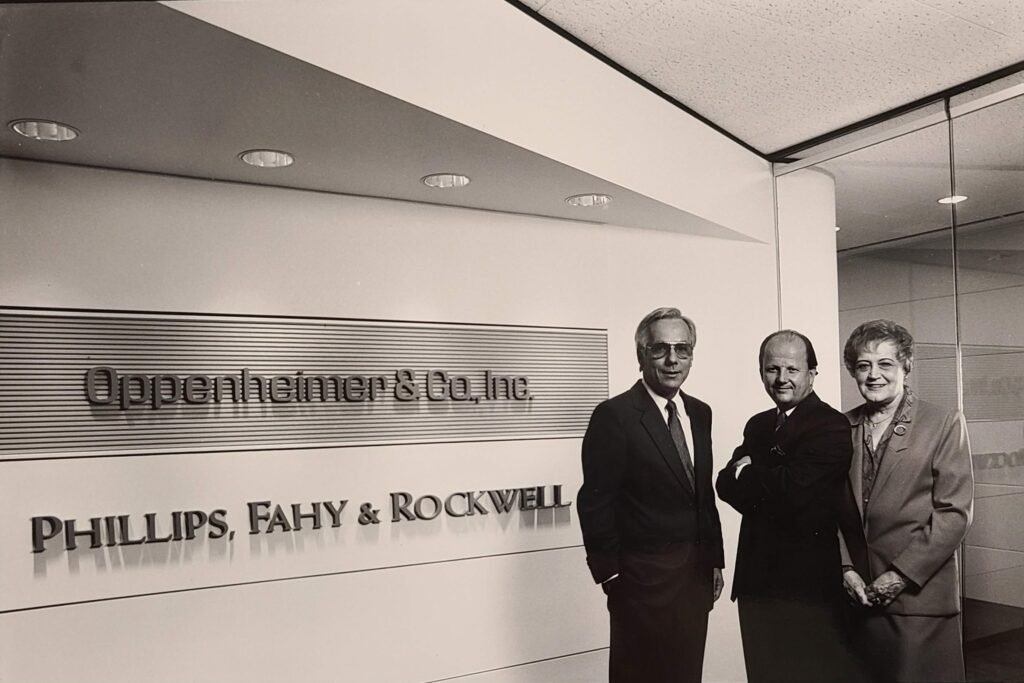
Of course, Rockwell’s legacy did not end with her career. Elizabeth was incredibly invested in the success of the University of Houston and intentional with her generosity to the institution. Her contributions all promote networking and interconnectedness between UH and the surrounding Houston community – especially the Houston business world, which was what she understood best. She established the C.T. Bauer College of Business Elizabeth D. Rockwell Career Center because, Clark noted, “her friends, who were the CEOs of corporations, told her that they didn’t have any place on campus to go when they wanted to interview students.” The EDR Career Center helps business students connect with potential employers, and find job opportunities through recruiting events, job boards, and career planning resources.
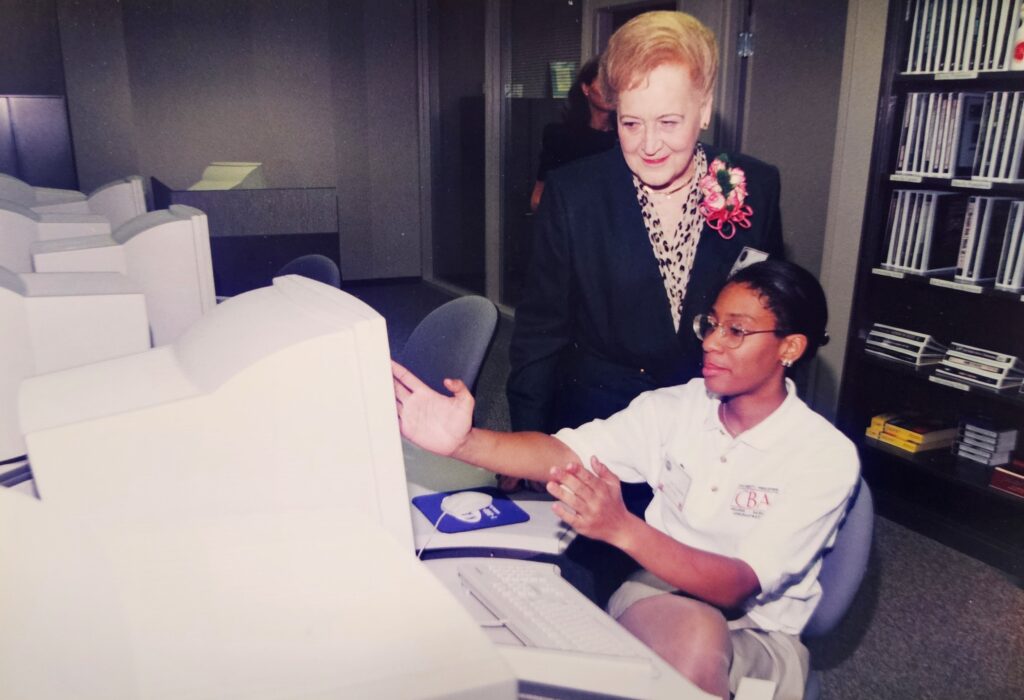
Rockwell underwrote multiple lecture series, including Discover UH, which she hoped would be “a bridge between Main Street and Cullen [Boulevard],” where UH is located. There were forty-eight lectures in total from professors, playwrights, healthcare professionals, historians, and more. Rockwell was a no-nonsense person, and Discover UH was known for its punctuality. As an example, Clark related the following: “Gene McDavid, the CEO of the Houston Chronicle at the time, would tell all his friends, ‘whenever I get an invitation to Discover UH, I accept right away because I know I’m going to learn something fascinating, I’m going to be able to network with top-level CEOs, and it’s only going to take my lunch hour.’” Rockwell also underwrote the Elizabeth D. Rockwell Lecture on Ethics and Leadership series in 2004. In 2020, nine years after her passing, her endowment led to the opening of the Elizabeth D. Rockwell Center on Ethics and Leadership at the Hobby School of Public Affairs, which offers scholarships and educational programming on ethics and leadership to students, faculty, and staff.
Rockwell became a leading supporter of the university’s libraries and archives. The first endowed chair she created was for the Dean of Libraries. “She understood it was one way that she could impact the most students because everyone uses the library,” Clark pointed out. The Elizabeth D. Rockwell Pavilion (2005) on the second floor of MD Anderson Library has served as a hugely useful, centrally located event and meeting space for the campus community. Having seen the limited places available for meetings and events, “[Elizabeth] knew that that would make a difference,” Clark said.
Rockwell also funded archiving the Elizabeth D. Rockwell Papers in Special Collections and was involved in its curation in the early stages. The collection holds hundreds of tapes and transcripts of interviews with Rockwell and the archivists working at the time, and includes Elizabeth’s personal commentary on the materials themselves.
Much more could be said of Rockwell’s contributions to UH, which make up the largest portion of the Elizabeth D. Rockwell Papers. However, Rockwell’s philanthropy and interests extended beyond the university. She was extremely involved in community groups like River Oaks Business Women’s Exchange Club, the Houston READ Commission, the Houston Heights Association, and the Galveston Historical Society. She was interested in history, loved to entertain, and was masterful at needlework. She also regularly contributed to the 50 Plus column in the Houston Chronicle.
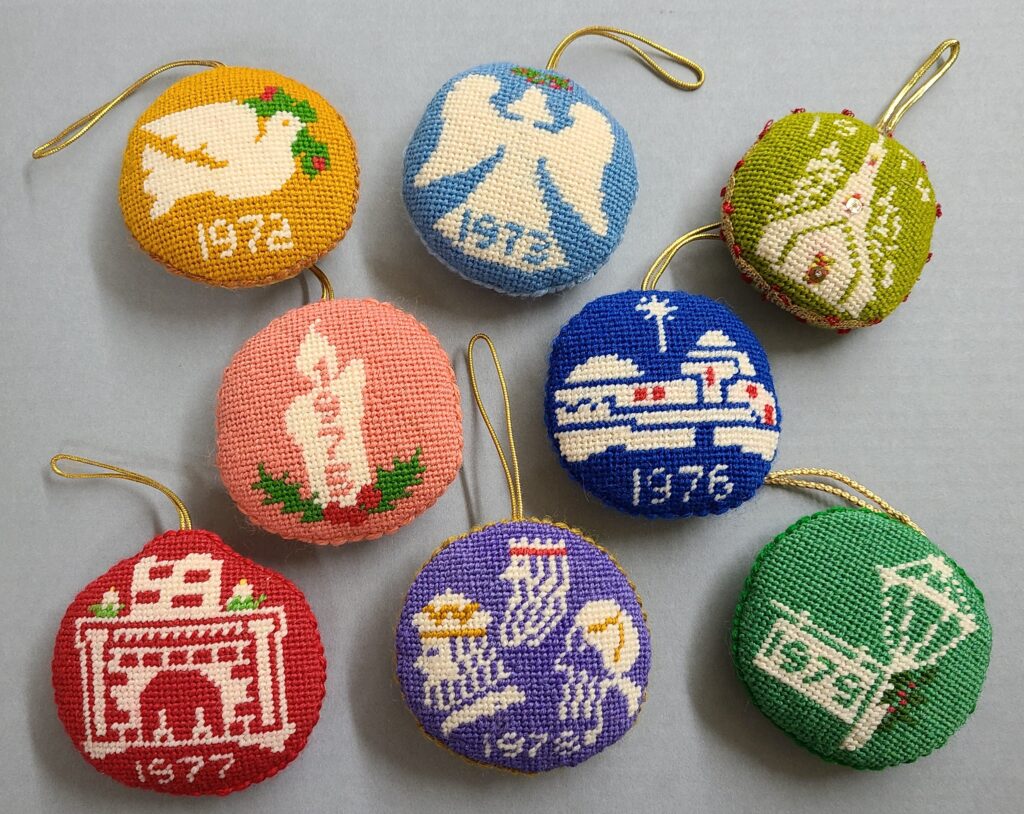
When I asked Clark what she liked most about Elizabeth as a person and a friend, she reflected on her pragmatism, her frugality, her excellent memory, and her thoughtfulness. Every time UH appointed a new president, “Elizabeth would give a rolodex to the incoming spouse that had her recommendations for the best dry cleaner, the best hair designer, the best tailor – all the things that you would need to know.” She was a remarkable person, and her impact on the University of Houston and the Houston community are still felt today. Clark reminisced, “Elizabeth wore so many hats: philanthropist, historian, businesswoman, community member, just a good person in Houston. I was very fortunate that our paths crossed.”
The Elizabeth D. Rockwell Papers reside in Special Collections in the MD Anderson Library at the University of Houston. Special Collections is open from 10:00 a.m. to 4:00 p.m. Monday to Friday.
To receive a print copy of this issuye or subscribe, click on Buy Magazines above.

To learn more about Rockwell’s legacy at UH, visit the website for the Elizabeth D. Rockwell Center on Ethics and Leadership here.
Watch the University of Houston’s official celebration of Elizabeth Rockwell’s life on the link below.
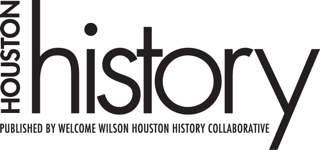
 Follow
Follow